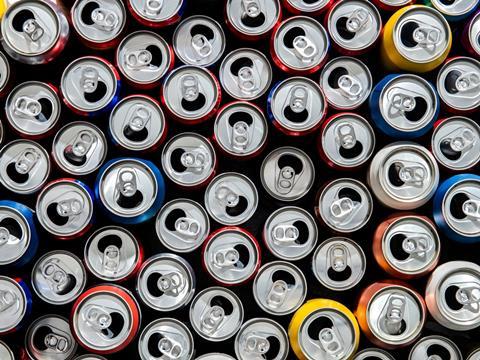
According to a new report from Metal Packaging Europe and European Aluminium, the overall recycling rate for aluminium beverage cans in the EU, UK, Switzerland, Norway, and Iceland reached a ‘record level’ of 76% in 2021 – yet it encourages the introduction of more ambitious separate collection targets for beverage containers to reach 90% recycling targets.
The 3.2% increase apparently brought the total amount of aluminium recycled from cans up to 570,000 tonnes – a 60,000-tonne increase from 2020.
In turn, this is believed to have saved 4.7 million tonnes of CO2 equivalent from entering the atmosphere; the companies suggest that this is equivalent to the annual amount of greenhouse gases produced by Antwerp, Poznan, or another European city with over half a million inhabitants.
Members of Metal Packaging Europe and European Aluminium alike have expressed their approval of the increased recycling rate, which is said to reflect continual efforts to improve recycling across supply chains and the industry as a whole.
On the other hand, they warn that several EU Member States still fail to achieve or exceed a 90% recycling rate and pushes for more ambitious collection targets for aluminium beverage cans and other drinks containers, as per the EU’s Packaging and Packaging Waste Regulation.
Krassimira Kazahska, CEO of Metal Packaging Europe, stated: “We are proud of the latest achievement and believe the industry is on the right path towards 100% circularity of aluminium beverage cans by 2050. Today, beverage cans are one of the most recycled packaging formats on the European market.
“Can manufacturers recently joined other industry leaders at COP 28 in a call to accelerate aluminium beverage can circularity and contribute to Net Zero 2050.
“Aluminium is a ‘permanent’ material which means that it can be recycled multiple times through high quality recycling processes without losing its inherent properties.’’
“We encourage Member States to implement well-balanced Deposit Return Systems (DRS) as this will help move to a fully circular solution for the aluminium beverage can via ‘can-to-can’ recycling,” added Maarten Labberton, director Packaging Group at European Aluminium. “Although used beverage cans (UBCs) can easily be recycled into other aluminium products like automotive or bicycle parts, customers are increasingly looking for high recycled content in their new cans.
“We can do this, providing Extended Producer Responsibility (EPR) schemes supply our remelting plants with sufficient quantities and quality of separately collected and sorted UBCs. Only DRS can guarantee this.”
The announcement comes as Carlsberg and Ball reveal their joint roadmap to achieve higher recycling rates and increase the amount of recycled content in their cans by 2030. This involves on-pack communication as to the recyclability of aluminium, trialling a deposit return scheme in Serbia, and more.
Aluminium Deutschland has also shared that tube and aerosol can deliveries to Germany increased by 4% and 0.5%, respectively, between 2022 and 2023. As such, it is ‘cautiously optimistic’ for the year ahead, even while high energy prices and skilled labour shortages persist.
Additionally, Depozīta Iepakojuma Operators is celebrating an 80% return rate upon the two-year anniversary of its own deposit return system in Latvia; this figure exceeds the 77% target set for plastic bottles by 2025 in the EU Single-Use Plastics Directive.
If you liked this article, you might also enjoy:
The Lidl approach to packaging sustainability
How did Brazil achieve its 100% aluminium can recycling rate – and can it be replicated in the EU?
Experts have their say on the EU’s Packaging and Packaging Waste Directive revisions
A deep dive into the most important packaging sustainability trends and solutions














No comments yet